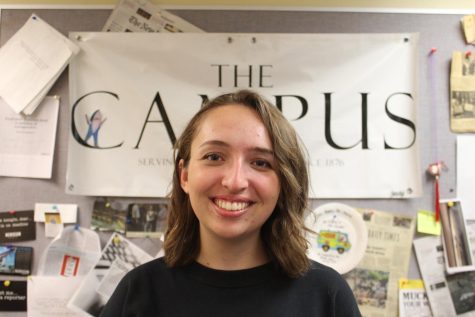‘The only difference between a suicide and a martyrdom really is the amount of press coverage’
Opinion editor signs off
I watched a movie about the Boston Strangler over the weekend. It was fine — it dragged a little near the end — but Keira Knightley was the star and I’m bound to like anything she does. The movie had all the trappings of the dogged-reporter-looking-for-a-scoop story: Late hours, angry editor, an unsupportive spouse, whiskey drinking and cigarette smoking. Heavy emphasis on the late hours.
It seems that movie journalists are a member of the Showbiz Triumvirate of Gloriously Overworked Saints, along with TV detectives and doctors. And since everyone interacts with content more than the real world these days, a lot of people get their understanding of what a newsroom looks like from movies like this one.
It’s true, we put in a lot of work to turn out our weekly issue. “Real” journalists put in a lot of work, too. It’s also true that our work is important, but these two circumstances are not related. Long hours do not equal importance and overextending yourself is far from a sign of wisdom.
So, I’m having trouble figuring out what to think about my time at the newspaper — and quite possibly as a journalist — ending.
When I attended the Athens Democracy Forum last fall, which was sponsored by the New York Times, journalism was at the forefront of all discussion. It seemed anybody who wanted quick applause needed to do was mention the hard work of journalists and — bingo. The whole room was on its feet.
I hear that journalism keeps people honest. It keeps people informed. It’s the first draft of history. It is the cornerstone of democracy. If you double-check our Constitution, you’ll see that 39 delegates, including George Washington and James Madion, agreed.
I don’t doubt any of that is true. I don’t doubt that journalism is one of the final institutions dedicated to accountability and the truth. I don’t doubt that even a small newspaper like The Campus is invaluable to its readers. I know our worth, and I’m proud of what journalists do.
It is also true that journalism faces a difficult climate right now. It needs more support than ever. But much like other hot-button issues, supporting journalism is no longer a matter of knowing its worth but rather touting its importance. These are very different — one is sympathetic, the other is performative. One bolsters, the other shouts. I draw the line when knowing your worth turns into self-importance. Humility will always be the thing that saves the world — the courage to admit when we’re wrong and see other people as collaborators, not obstructions.
We all want to make an impact, especially as the world seems to become more and more messed up. We’re desperate to prove that what we’re doing — whatever we’re doing — is important to somebody other than ourselves. There’s nothing wrong with that. But it’s not an arms race. We fall victim to the mentality that, should our work be less critical than others, we are less human. And, on the flip side, there is the mentality that our work is singularly vital and impressive and those other poor schmucks are just living in our world.
Neither will do. Journalism is just as important as the government it holds accountable. Artists are just as important as doctors. A B.A. in philosophy is just as important as a B.S. in environmental science and sustainability.
I said I’m having trouble figuring out what to think about my time at the newspaper. It’s mostly because, until recently, I felt uncomfortable claiming that I was a journalist. I thought that other people put in more hours and effort than me, that I had faked my way in and was coasting along in a position which I didn’t qualify to hold.
I’m over that now. I made a decision a while ago that my life should be for living, not for work. I’ve put in as much work as I’m willing to and no more, unlike Keira Knightley’s character, and I don’t feel bad about it.
In his novel “Survivor,” Chuck Palahniuk wrote, “The only difference between a suicide and a martyrdom really is the amount of press coverage.” There’s a lot of that going around, and a group of people convinced they’re martyrs never helped anyone other than the Vatican. If we want to truly be valuable, suicide and martyrdom alike must fall away to a way of living that serves life.
So. Sydney Emerson, Opinion editor, this is your life: I joined the newspaper because a smart friend of mine pointed out that, if I want to be a writer, I should probably take every opportunity available to write. I’ve contributed an article to every section, save Science. (Sorry, Caroline.) I’m proud of the work that I did. I think it was valuable. I know my worth.
In his novel “Breakfast of Champions,” Kurt Vonnegut drew a wonderful illustration of a headstone that reads:
SOMEBODY
[Sometime to Sometime]
He Tried.
At the end of this article, the end of my reign of terror over page 4 of The Campus, that is how I want to be remembered. Not as a chainsmoker at a typewriter, not as an intrepid girl reporter, not as overworked, but as somebody who did their best. I tried.

Sydney Emerson is a member of the class of 2023. She is from Bradford, Pennsylvania and is an English major with a history minor.




Kaleigh White • May 15, 2023 at 12:43 am
You should be so proud of all the work you put in as Opinion Editor. Your reign of terror may be over, but the horrors of which you wrote shall live on for eternity. (I learned that the hard way, as someone a couple weeks ago asked me if I was the one who wrote the “Batman is a furry” article.)
Your work mattered. Not only did you do your best, but it really did show. <3
Prof Alexis Hart • Apr 30, 2023 at 11:56 am
Thank you for all your contributions to The Campus and the campus, Sydney. Thank you for your honesty and willingness to pull back the curtain. You will be missed. –Prof Hart